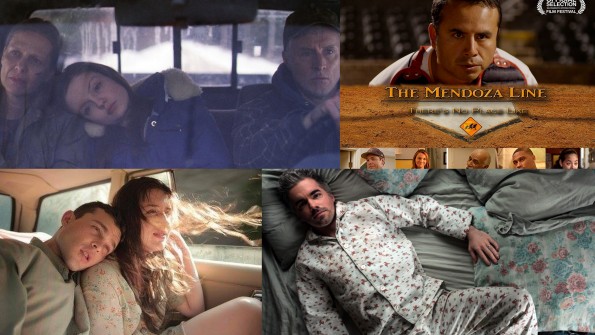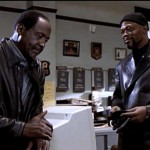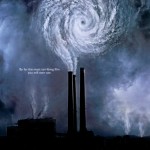There is simply no way for the average viewer to keep up with all the screening choices she (or he) has available in a given month. Even if you live away from New York, Los Angeles, or some festival center, streaming choices proliferate. Periodically we try to keep you abreast of some better options from among the sea of titles that you may run across on Amazon or platforms.
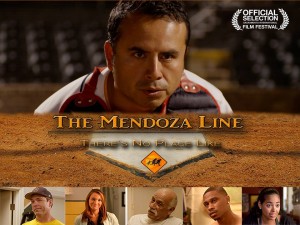 The Mendoza Line begins with a Spanish language rendition of “This Land is Your Land.” It ends with an English language singing of ‘The Star Spangled Banner” (which reverts back to the Spanish language song over the credits). Ricardo Perez (Juan Carlos Arena) may be undocumented, and he may be struggling to hang on at the lowest levels of the American dream, but make no mistake, this film is a celebration of that dream. Written and directed by Nathan Kaufman, The Mendoza Line is the third baseball movie the auteur has helmed. The scenes are infused with realistic dialogue. They don’t really go anywhere, though, at least not story-wise. The Mendoza Line plays like a cross between Studs Terkel’s Working and a remake of Bull Durham without the A-list cast. The film has a few surprises up its sleeve, particularly as it carefully observes how the grind of the minors impacts family relationships. There’s not much here that you couldn’t get from a good piece of long-form sports journalism, and the vignettes play a bit like a bunch of supporting characters in search of a headliner. But the characters are believable and likable. (2.5/5)
The Mendoza Line begins with a Spanish language rendition of “This Land is Your Land.” It ends with an English language singing of ‘The Star Spangled Banner” (which reverts back to the Spanish language song over the credits). Ricardo Perez (Juan Carlos Arena) may be undocumented, and he may be struggling to hang on at the lowest levels of the American dream, but make no mistake, this film is a celebration of that dream. Written and directed by Nathan Kaufman, The Mendoza Line is the third baseball movie the auteur has helmed. The scenes are infused with realistic dialogue. They don’t really go anywhere, though, at least not story-wise. The Mendoza Line plays like a cross between Studs Terkel’s Working and a remake of Bull Durham without the A-list cast. The film has a few surprises up its sleeve, particularly as it carefully observes how the grind of the minors impacts family relationships. There’s not much here that you couldn’t get from a good piece of long-form sports journalism, and the vignettes play a bit like a bunch of supporting characters in search of a headliner. But the characters are believable and likable. (2.5/5)
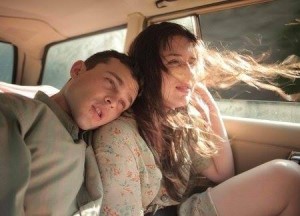 The characters in Running Wild are pretty far from likable. Directed by Melanie Shaw and starring Alden Ehrenrich and Zoë Worth, it plays like a and looks the most like student work of any of these four films. Always competent visually but either lacking a sense of story or limiting itself to that which can be filmed between two people in one place, the film tracks the relationship of Liza and Eli. Sort of a post-secondary When Harry Met Sally or What If? but without the more overt attempts to link the characters romantically. (Okay, maybe a two person Big Chill without the reunion corpse?) As I move into the back half of middle age, movies about the affectations and dissatisfactions of youth leave me cold, but at least Liza and Eli are less obnoxious than the cast of Fort Tilden or any random character from Girls. Honestly, Running Wild isn’t horrible, but I do find myself wondering for who are such films made? I think we are beyond thinking that Millenials will see the floundering of other young adults and take comfort. I don’t think casual film watchers will see it and feel pity. The film twice references Bonnie and Clyde, once at the outset. That sort of prominent name-checking has come to make me wonder if somebody–writer, director–referenced a film that was personally meaningful as a means of interjecting some particularity into a genre that is increasingly monotone and conventional. The problem is, I then spend large chunks of the movie I’m supposed to be watching thinking about how much I’d rather be watching the movie that got name checked. (2/5)
The characters in Running Wild are pretty far from likable. Directed by Melanie Shaw and starring Alden Ehrenrich and Zoë Worth, it plays like a and looks the most like student work of any of these four films. Always competent visually but either lacking a sense of story or limiting itself to that which can be filmed between two people in one place, the film tracks the relationship of Liza and Eli. Sort of a post-secondary When Harry Met Sally or What If? but without the more overt attempts to link the characters romantically. (Okay, maybe a two person Big Chill without the reunion corpse?) As I move into the back half of middle age, movies about the affectations and dissatisfactions of youth leave me cold, but at least Liza and Eli are less obnoxious than the cast of Fort Tilden or any random character from Girls. Honestly, Running Wild isn’t horrible, but I do find myself wondering for who are such films made? I think we are beyond thinking that Millenials will see the floundering of other young adults and take comfort. I don’t think casual film watchers will see it and feel pity. The film twice references Bonnie and Clyde, once at the outset. That sort of prominent name-checking has come to make me wonder if somebody–writer, director–referenced a film that was personally meaningful as a means of interjecting some particularity into a genre that is increasingly monotone and conventional. The problem is, I then spend large chunks of the movie I’m supposed to be watching thinking about how much I’d rather be watching the movie that got name checked. (2/5)
The Widowers was probably not the best of these four films, but it was my favorite. The subtitle was “a comedy about grief.” Here I thought the lower budget was a plus, since I had a few harrowing flashes of how the delicious set up and dead-pan delivery would get wrecked by an inevitable studio/star remake. Just think how much Adam Sandler would milk the turns from farce to painful truth and back again… A pair of friends attend a grief camp–a cross between a support group, therapy, and summer camp for grown ups. The incessantly cheerful camp leader devises exercises designed to get the men to open up about their feelings. They have to say something about how they felt when their spouse died and then kick a ball. They have to move into and around a circle when the person in the middle says something that is true of them. The Widowers perfectly nails that deadpan vibe one gets out of Dilbert or The Office, inviting us to laugh at the ridiculousness of our self-help advice but never at the widowers themselves. I felt like the inevitable turn to the serious was a little too on-the-nose for my tastes. The depth of the characters’ pains did not need to be acted out for us to understand it was there. Overall, though, there is some daring in playing the subject for laughs, and I appreciated the way the film didn’t turn those running the camp into villains, cynics, or idiots. (3/5)
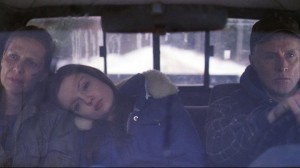 Bluebird comes with a small slew of advantages over the other three films: established and popular actors (John Slattery, Margo Martindale), some exterior photography that makes the setting a character, and, above all, the Tribeca label. Like The Widowers, Bluebird is a film about grief. Unlike The Widowers, it is neither a comedy nor an examination of personal grief. Its antecedents are films like Rabbit Hole, The Sweet Hereafter, and A Map of The World, ones that observe the ripples of grief that slide through a community as the result of personal tragedies. Amy Morton plays Lesley, a Maine bus driver who is momentarily distracted while checking her bus for stragglers. When that distraction leads to the worst possible outcome, the resulting tragedy rips apart the already weak bonds that hold the community together. Bluebird begins with a quote from Thoreau, and while it wasn’t from The Maine Woods, it was enough to evoke that author’s lesser known work. In that text Thoreau compares men to “busy demons,” suggesting their ultimate work is to destroy the woods. It’s important, then, to see the setting as an integral part of this story. These events could happen anywhere cold, but by setting it in Maine and evoking Thoreau, Lance Edmands invites us to see the underlying cause of so much of our grief as busy-ness and distraction. (3.5/5)
Bluebird comes with a small slew of advantages over the other three films: established and popular actors (John Slattery, Margo Martindale), some exterior photography that makes the setting a character, and, above all, the Tribeca label. Like The Widowers, Bluebird is a film about grief. Unlike The Widowers, it is neither a comedy nor an examination of personal grief. Its antecedents are films like Rabbit Hole, The Sweet Hereafter, and A Map of The World, ones that observe the ripples of grief that slide through a community as the result of personal tragedies. Amy Morton plays Lesley, a Maine bus driver who is momentarily distracted while checking her bus for stragglers. When that distraction leads to the worst possible outcome, the resulting tragedy rips apart the already weak bonds that hold the community together. Bluebird begins with a quote from Thoreau, and while it wasn’t from The Maine Woods, it was enough to evoke that author’s lesser known work. In that text Thoreau compares men to “busy demons,” suggesting their ultimate work is to destroy the woods. It’s important, then, to see the setting as an integral part of this story. These events could happen anywhere cold, but by setting it in Maine and evoking Thoreau, Lance Edmands invites us to see the underlying cause of so much of our grief as busy-ness and distraction. (3.5/5)

